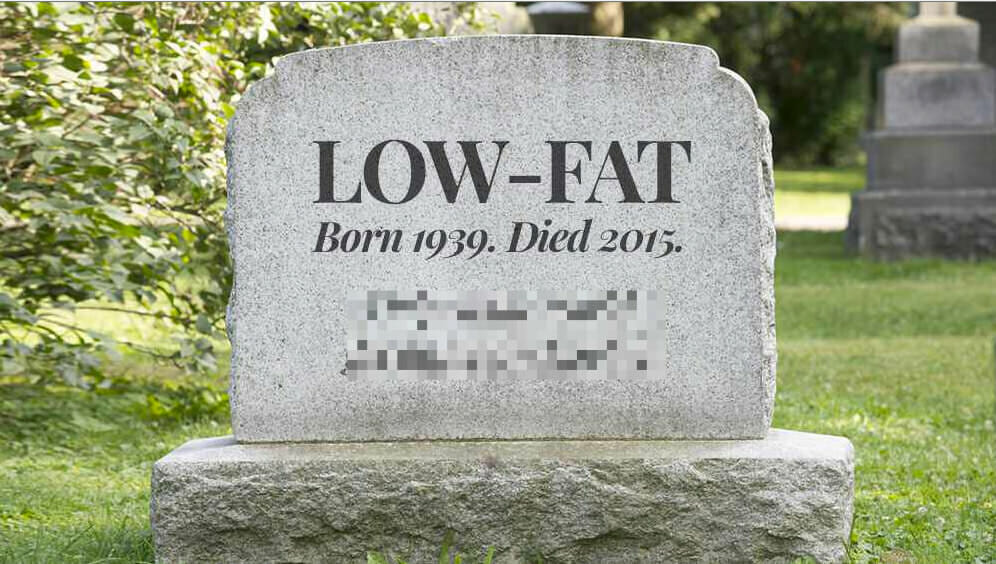
In the beginning, the traditional low-fat diet plan was based upon really weak scientific evidence, which has since been thoroughly disproven.
It is quite amazing that this diet became as widespread as it did. In the previous couple of years, lots of studies have revealed that this diet plan is an extremely bad choice.
Not just is it shown to be inadequate, it can also be downright dangerous for a lot of people.
Here are 7 reasons why the low-fat diet can harm your health, and why it should be avoided.
1. The Low-Fat Diet Motivates Consumption of Harmful Foods
When the low-fat standards first came out, food manufacturers followed suit.
They wished to bring a whole lot of “heart healthy” low-fat foods to the marketplace, in order to offer to the health mindful crowd.
Nevertheless, there is one huge problem with foods that have had the fat gotten rid of from them … they taste like crap.
For this reason, the food manufacturers sugarcoated their products. Sugar is not a fat, it’s a carbohydrate. For that reason, an item can be identified “low fat” even though it is packed with sugar.
(I ought to point out that the low-fat guidelines DO suggest that we reduce refined sugars, however not almost as enthusiastically as they caution us about the “harmful” fats).
The standard low-fat diet (brought to you by the United States Department of Agriculture) likewise advocates enhanced intake of specific foods:
Veggie Oils: Vegetable oils can minimize cholesterol in the short term, but in the long term, they trigger damage and are significantly connected with swelling and heart disease.
Whole Wheat: A substantial part of the population might be vulnerable to wheat gluten, experiencing symptoms like pain, stool inconsistency, tiredness, amongst different other signs.
Essentially, given that the low-fat guidelines came out, people have enhanced their intake of damaging foods like sugar, wheat and veggie oils.
Bottom Line: Numerous high sugar junk foods with a low-fat label have actually flooded the market. The low-fat diet plan also promotes usage of foods now known to cause harm.
2. The Low-Fat Diet plan Can Raise Your Triglycerides
Having elevated triglycerides in the blood is a well known risk element for cardiovascular disease.
It is also one of the features of the metabolic syndrome, a cluster of symptoms thought to play a causal role in disease and weight gain.
When blood triglycerides are elevated, it is typically because the liver is turning excess carbs (especially fructose) into fat.
Because the low-fat diet is also a high-carb diet, this diet can cause an increase in blood triglycerides, possibly raising the danger of heart disease .
The very best way to lower triglycerides is to consume in the exact opposite method, a low-carb, high-fat diet. Such a diet regularly leads to decreases in blood triglycerides.
Bottom Line: The low-fat diet is really high in carbohydrates. Excess carbohydrates are turned into fats in the liver, which raise blood levels of triglycerides, a crucial cardiovascular danger aspect.
3. The Low-Fat Diet Dissuades Consumption of Healthy Foods
Animal foods that are naturally high in fat have the tendency to be healthy and nutritious.
While I agree that factory farmed, grain-fed animal items aren’t an ideal option, foods from animals that have been effectively raised and fed are really healthy.
The low-fat diet plan discourages individuals from taking in these foods due to the fact that they consist of saturated fat and cholesterol.
Here’s a newsflash: Neither hydrogenated fat or cholesterol have ever been shown to trigger damage.
It was a myth all along, they have now been shown to be completely safe in numerous large, long-term studies.
Blaming the upsurges of weight problems, diabetes or cardiovascular disease on fatty animal foods makes definitely no sense, because the diseases are fairly new, while the foods have been with us all along.
Plenty of populations throughout the world, for example the Inuit and the Masai, have taken in practically all of their calories from animal foods and continued to be in outstanding health.
Here are 4 examples of foods that have been demonized due to the misguided war on saturated fat:
Meat: Naturally fed meat is an excellent source of Omega-3 fats, CLA, vitamins and minerals along with important nutrients like Carnosine and Creatine .
Eggs: Eggs are among the healthiest foods in the world. They are loaded with vitamins and minerals, together with Choline and powerful antioxidants that protect the eyes .
High-fat milk equipments: Grass-fed dairy equipments are the very best source of Vitamin K2 in the diet. Likewise packed with Calcium, CLA and lots of other nutrients .
Coconut: Coconut items consist of fats that are connected with effective health positive aspects, consisting of enhanced fat burning, much better blood lipids and improved brain function.
Bottom Line: Foods that are naturally high in saturated fat and cholesterol have the tendency to be extremely nutritious and completely healthy. The low-fat diet plan prevents intake of these foods.
4. The Low-Fat Diet Can Lower HDL (The “Great”) Cholesterol
High Density Lipoprotein (HDL) is typically described as the “great” cholesterol.
It is well understood that having high levels of HDL is connected with a lowered danger of cardiovascular disease.
Consuming more fat can raise HDL levels, while a high carb consumption can result in a reduction .
For that reason, it is not surprising to see studies where a low-fat, high-carb diet plan leads to reductions in HDL, which might cause an enhanced threat of cardiovascular disease.
Among lots of great ways to raise HDL levels is to eat a low-carb diet.
Bottom Line: HDL is referred to as the “great” cholesterol and is related to a reduced threat of heart problem. Researchers reveal that the low-fat diet reduces blood levels of HDL.
5. The Low-Fat Diet Decreases Testosterone Levels
Testosterone is the main sex hormonal agent in males, but women have small amounts of it too.
Like other steroid hormones, testosterone is produced out of cholesterol.
Having adequate testosterone levels is important for different aspects of health in both males and females.
Having low testosterone levels can lead to reduced muscle mass, increased body fat, osteoporosis, depression, decreased sex drive, to name a few.
One of the negative effects of a low-fat diet plan may be substantially minimized testosterone levels.
Bottom Line: Testosterone is a very important hormonal agent in both men and women. Low-fat diets can considerably reduce testosterone levels.
6. The Low-Fat Diet Can Damage The Pattern of LDL (The “Bad”) Cholesterol
Low-Density Lipoprotein (LDL) is typically referred to as the “bad” cholesterol.
It is well established that elevated LDL levels are connected with an enhanced danger of cardiovascular disease.
However, brand-new information is revealing that there are subtypes of LDL. We have little, thick LDL (called pattern B) and Huge LDL (called pattern A).
The small, dense particles (sdLDL) contribute to heart disease, NOT the big ones.
A high consumption of carbs (particularly improved carbs) enhances sdLDL, while saturated fat and cholesterol alter the LDL particles from the little, dense (bad) subtype to the huge (benign) subtype.
Researches show that low-fat diets move the LDL pattern to small, dense particles, while low-carb, high-fat diets shift them towards huge particles.
Bottom Line: Even though low-fat diets may trigger mild decreases in LDL cholesterol, at the same time they move the pattern of LDL cholesterol from Large LDL (which is benign) towards small, thick LDL (which is really damaging).
7. The Low-Fat Diet Gives You Cardiovascular disease
Heart disease is the most typical cause of death in middle- and high earnings countries .
It is understood that conventional populations that don’t eat a Western diet plan have hardly any heart problem.
When these populations adopt a western diet plan, they quickly end up being obese, diabetic and start dying from cardiovascular disease.
For that reason, it appears quite clear that the western diet plan is a significant contributor.
There have actually been a number of huge, long-lasting randomized regulated trials (which are the gold requirement of science) that have analyzed the effects of low-fat diet plans on the threat of heart problem.
MRFIT: A low-fat diet did not decrease heart disease in a group of 12,866 males at a high risk of having a cardiac arrest, in spite of the reality that many of the males gave up smoking cigarettes.
Look AHEAD: A 9.6 year research study of 5,145 diabetics exposed that the low-fat diet plan did not minimize cardiovascular disease, despite the truth that they managed to meet some weight goals by required calorie constraint
Be aware that they are comparing the low-fat diet to the standard western diet plan, which is basically as bad as a diet plan can get.
The low-fat diet is quite simply not good for you. With this in mind, consider keeping your diet more natural. When eating a diet which is balanced with vegetables, fruits, lean proteins and healthy fats, you will get the vitamins and nutrients your body really needs to stay healthy and disease free.





No comment yet, add your voice below!